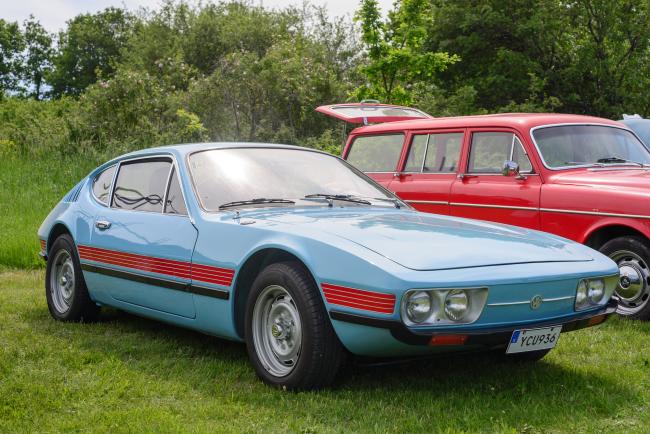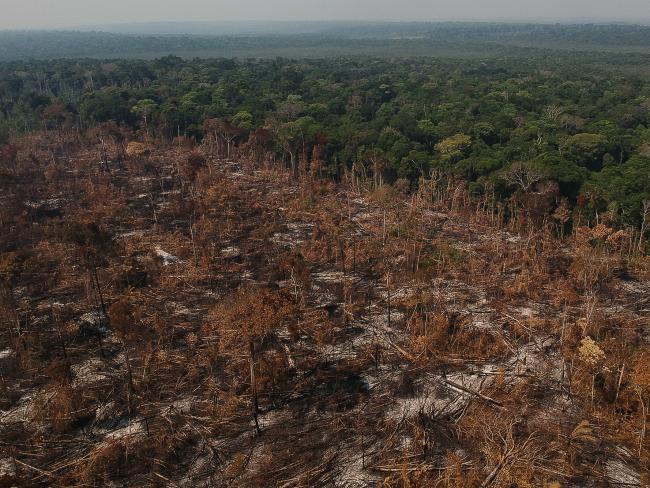
The young men were lured with false promises of decent work and a real football pitch to play on. The reality turned out to be very different: exhausting and repressive working conditions to which they were tethered by debt bondage.
This was the experience of hundreds of rural workers who were subjected to slavery-like labor in the 1970s and 1980s on the Vale do Rio Cristalino ranch in Pará, a state in northern Brazil spanning part of the Amazon. The ranch owner was Volkswagen do Brasil, the Brazilian subsidiary of the German automaker.
Nearly half a century later, prosecutors in Brazil are seeking reparations for the victims of modern slavery on the Volkswagen ranch. Their accusations of human rights violations are backed by a vast body of evidence. But Volkswagen rejects all allegations and denies being responsible for the use of slave labor on its farm. In March of this year, the company walked away from negotiations with prosecutors.
The case shines a light on Volkswagen’s cozy relationship with the military governments that ruled Brazil throughout the 1964-1985 dictatorship—and how these governments facilitated all manner of socioenvironmental abuses. It also highlights the challenges in holding powerful corporations to account.
The Volkswagen Farm in the Amazon
In 1973 Volkswagen acquired around 140,000 hectares of land in Santana do Araguaia, south Pará, with the objective of turning the forest into cattle pasture. The company was seeking a fiscally advantageous way of investing its profits from the auto industry and harbored the ambition of developing an optimized cattle breed. It had the blessing and encouragement of the military government, for whom this ranching project fitted into its policy of aggressively developing the Amazon.
Under the nationalist slogan “integrar para não entregar” (integrate so as to not submit), the military governments oversaw the construction of roads cutting through the Amazon and backed the creation of sprawling ranches like Volkswagen’s Vale do Rio Cristalino farm, all with the aim of populating and monetizing the rainforest.
This developmentalist policy was destructive. It came at a heavy socioenvironmental price, riding on the exploitation of poor Brazilians, leading to an Indigenous genocide, and kickstarting the widescale deforestation that besets the Amazon to this day—all funded by the Brazilian taxpayer, as companies like Volkswagen were generously subsidized for their Amazon activities.

Volkswagen received R$700 million in present-day value (around $140 million) from the Brazilian government through tax deductions and other fiscal perks, according to estimates from prosecutors today. “And these resources were used to cut down the forest, create environmental damage, violate labor laws, and use slave labor,” says Ricardo Rezende, a Catholic priest and anthropologist who first denounced Volkswagen 40 years ago.
Nonetheless, the ranch became a losing enterprise in 1980, and Volkswagen decided to sell it in 1986.
“A Brutal and Violent Reality”
Rezende moved to Pará in 1977 while working for the Pastoral Land Commission, an organization linked to the Catholic Church. He says he immediately started receiving reports of slave labor and assassinations taking place on the ranches in the region, owned by massive corporations. One of them was the Volkswagen farm.
In 1983, three workers managed to escape the ranch and recount the abuses they suffered and witnessed there. Rezende made the accusations against Volkswagen public.
“The workers were punished, they received false promises in some of the poorest municipalities of Brazil and were trafficked into the farm, and when they got there, they were faced with an extremely brutal and violent reality,” says Rafael Garcia, the prosecutor leading the current investigation into Volkswagen’s human rights violations.
This reality included poor sanitary conditions, exposure to health dangers like malaria, exhausting working conditions carried out under armed supervision, and “all kinds of physical and psychological torture,” says Garcia.
Debt bondage and a harsh geography prevented the workers from leaving. Matheus Faustino, a researcher who decades later worked on identifying some of the victims as part of the Group on Contemporary Slave Labor (GPTEC) coordinated by Rezende at the Federal University of Rio de Janeiro, explains how the workers were forced to buy everything they needed—from the tarpaulin under which they sheltered to their work supplies and food—at exorbitant prices from a canteen run by the so-called gatos, the contractors who hired them on behalf of Volkswagen to clear the forest for pasture.
“They always finished the work [they’d been hired for], but they were always in debt—and they’d have to start another round of work,” Faustino says. In one particularly shocking case, he says, two workers from the state of Tocantins were sold to another ranch.
Back in 1983, Rezende’s accusations were picked up by the international press, but he says they made little noise in Brazil. “I suspect that the main reason wasn’t the fact that we were in a dictatorship. I think the main reason for the silence of the Brazilian press was the importance of Volkswagen in advertising,” he says.
Volkswagen denied the accusations, laying the blame for any abuses that may have been taking place on contractors. But investigators say it is impossible that the company did not know what was going on. “Volkswagen was fully aware of the conditions to which the workers were submitted. The farm manager himself, [Andreas] Brügger, never denied knowledge of what was going on inside,” says Garcia.
Rezende recalls an encounter with Brügger during a visit to the farm in 1984, when the Swiss national confronted him. “He challenged me, he said ‘give me the name of a farm that does things differently.' I said, ‘I have no name, but everyone who is doing this [using slave labor] is wrong, including yourselves. The fact that everyone is doing it doesn’t legitimize it.’”
Feeble attempts to investigate and prosecute Volkswagen at the time went nowhere. “In the same way that we couldn’t trust the local police, we also had problems with prosecutors and the judiciary. Due to the moment, which was the dictatorship, due to the context which was one of threats and deaths. And the authorities didn’t act, either out of fear or because they were complicit with the crimes,” says Rezende.
The priest sat on his archive of documents for years, waiting for a more propitious moment.
Holding Volkswagen to Account
More than 25 years after the end of the dictatorship, a National Truth Commission set up by former president Dilma Rousseff (2011-2016) to investigate the abuses of the military era found that several corporations had closely collaborated with the military’s repression. Volkswagen was among them.
The company appointed a historian to look into its past in Brazil, and in 2020 it reached an agreement to pay R$36 million ($7.3 million) in compensation for its role in helping the military dictatorship identify supposed “subversives” among the workers at its car factory in São Bernardo do Campo, in the state of São Paulo. It was around that time, in 2019, that Rezende handed over his body of evidence on the human rights violations committed by Volkswagen in the Amazon to labor prosecutors.
“[The Volkswagen case] fits into a perspective of memory and truth and finding out what happened during the military dictatorship, of establishing the facts,” says Garcia, who launched an investigation based on the evidence provided by Rezende.
The Labor Prosecution Office (MPT) identified around 15 men who had worked in conditions of modern-day slavery on the Volkswagen farm—“a considerable number of workers considering the time [passed] and absence of documentation,” Garcia notes—and summoned Volkswagen last year to negotiate compensation.
Modern-day slavery remains a widespread problem in Brazil. According to Faustino, some 56,000 people have been freed from slavery-like labor conditions since 1995, while the NGO Walk Free recently estimated that there are approximately one million people in situations of modern-day slavery in Brazil.
“Brazil has a legacy from slavery that impacts society today,” says Faustino, while stressing that the country also has an active civil society and robust legislation to effectively fight this dehumanizing and illegal practice.
Under the current government led by President Luiz Inácio Lula da Silva, 1,201 people were freed from slavery-like labor conditions between January and April of this year. “Slavery-like labor is a plague, and we will prioritize its eradication. […] We will restart inspections of degrading work, rigorously punishing those who use slavery-like labor,” said Labor Minister Luiz Marinho.
In the Labor Prosecution Office, Garcia and his team are still working to punish the abuses from the last century. They are seeking R$165 million ($33.5 million) in reparations from Volkswagen.
But after several rounds of talks, Volkswagen abruptly left the discussions in March. The company said in an email statement that it “rejects all the allegations presented in the records of the current investigation into Fazenda Vale do Rio Cristalino and disagrees with the unilateral presentation of facts presented by third parties.”
Garcia says that Brazil is now preparing to take the matter to court, both in Brazil and in international human rights courts in the Americas and Europe.
“Volkswagen has an obligation to recognize [the abuses] and compensate the victims and Brazilian society,” the prosecutor stresses. But even if this attempt at reparations proves successful, Rezende and Faustino highlight that many other abuses from that period—perpetrated by Volkswagen and other companies—remain unacknowledged and unpunished. Meanwhile, the very same exploitative dynamics in which employers blame contractors for inhumane labor practices rooted in racism and oppression persist in Brazil today.
Constance Malleret is a freelance journalist based in Rio de Janeiro, Brazil. She covers Brazilian politics, human rights, and social and environmental issues.

